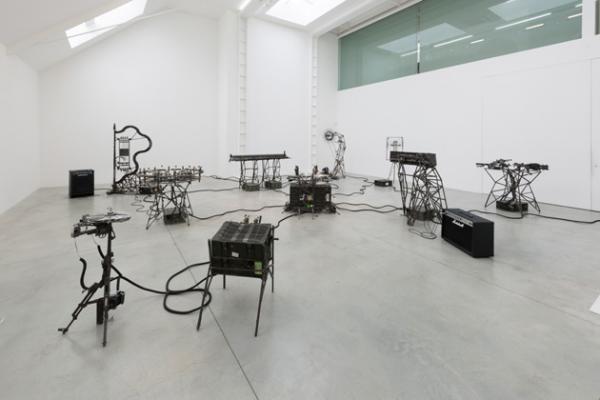Most people haven’t heard of “Legislative Theater,” thought it’s been around for about fifty years. The idea is to use the arts – and more specifically, theatrical productions – to affect social and political change in a specific, concrete way.
And although the concept was born in South America, Pedro Reyes has brought it to the United States. In a recent National Public Radio story, he explains how the concept came to be a reality. It began seven years ago when Culiacan, a city in Mexico, collected more than 1,500 guns in an effort to curb violence on the streets.
Reyes and his cohorts then took the guns, melted them down and turned them into shovels. Then, each of the 1,500-plus new shovels was used to plant a tree. But Reyes was inspired to do more. Specifically, he felt compelled to help inform the United States citizenry and political powers that be of their impact on Mexican life.
As he describes in the NPR story, living south of the border is not unlike having an upstairs neighbor with a leaky roof. "Just what is leaking is hundreds of thousands of guns," he says.
For his latest project, “Disarm,” the Mexican government handed more than 6,700 confiscated weapons over to Reyes, which Reyes then converted into a veritable orchestra of musical instruments. The instruments were displayed in a campus museum at the University of South Florida, and then were used in a performance on campus, followed by a talk with the audience about the impetus behind, and goals of, the project.
Understanding the process of turning an implement of death and violence into a tool for creativity and imagination is one part of the strategy. In doing so, there is hope that participants in such an event will begin to reimagine their own world and how they engage it. After all, true change first begins with imagining the possibility of such transformation.
Further, Reyes hopes to challenge U.S. citizens to consider their relationships with guns, and moreover, the impact that value has on people in other countries. Again, in the NPR story, Reyes explains, “We have to be allowed to ask questions. If you are not allowed to ask questions, you are not free."
Some who read the prophet Isaiah’s words, when he hearkens the image of doing precisely what Reyes is doing as part of his project, imagine it simply as an idealistic dream, rather than a creative call to action. Theologian Walter Wink, among others, took up this mantel in modern times, urging us to challenge the notion that there are only two options when faced with violence or oppression: fight force with force, or do nothing in the name of peace.
Such thinking, Wink and others suggested, reflects a limitation of human imagination, rather than reality. Although, on the surface, it may seem absurd to combat the proliferation of guns and all that accompanies them with art. It feels soft, flimsy, even self-indulgent. But As Reyes recognizes, art is a powerful means to turn human hearts and challenge minds to think differently, and perhaps, even act differently.
Part of the challenge is to reorient our thinking about the place of art in our culture. Though in many cases it has been distilled down to a commodity to be packaged and sold as entertainment or pleasant distraction, it has the potential to stir us at a level beyond the reach of rhetoric, cerebral knowledge, or basic logic. When properly presented and engaged, great art invades our dreams and haunts our waking hours. It causes us to see reality in a new way, and sometimes even presents an alternative vision for what the future could look like.
For Reyes, that vision is one in which the mass of assault rifles, shotguns, and pistols stop flowing so plentifully into his country. It’s a vision in which we come together to solve problems creatively, rather than defending existing position from behind the barrel of a gun.
It’s one small step toward living into Isaiah’s kingdom-inspired vision of peace, in which we are so driven to create and share that old implements of war and violence lose their value and purpose in the culture.
It’s a dream worth chasing.
Christian Piatt is a Sojourners Featured Writer and an author, editor, speaker, musician, and spoken word artist. He is director of church growth and development at First Christian Church in Portland, Ore. Christian is the creator and editor of Banned Questions About The Bible and Banned Questions About Jesus . His new memoir on faith, family and parenting is called PREGMANCY: A Dad, a Little Dude and a Due Date .
Got something to say about what you're reading? We value your feedback!
